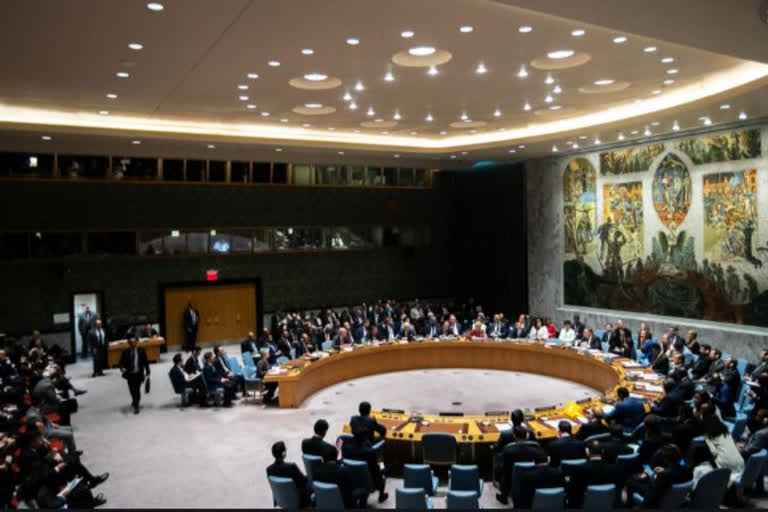New Delhi: India commenced its two-year stint as a non-permanent member of the 15-nation UN Security Council this January. Ever since then, India has shown a willingness and is doing its bit to bring about an inclusive solution to matters of international peace and matters concerning the security of the world as a whole.
Time and again India has pointed out that the most powerful organ of the world body-UNSC lacks inclusivity of those who need to be the members of the UNSC, as a result of which, the council is founding itself unable to act effectively to address increasingly complex issues of international peace and security.
Therefore, India along with Germany, Japan, and Brazil has been continuously pressing for urgent reform of UNSC and a permanent seat in the reformed 15 member top organ of the world body.
India at various global platforms has reiterated its stance for the need of reformed multilateralism and has remained committed to raising its voice against issues like terrorism, human rights violation that is precarious to global security and humanity. But there are challenges to its credibility and its effectiveness.
An expert opines that as India is a non-permanent member of the UNSC now for the next two years, it will act as a platform for the country to raise the issue of UNSC reforms much more explicitly. But the world is entering a phase where great power contestation is very high.
Prof Harsh V Pant, Director, Studies and Head of the Strategic Studies Programme, Observer Research Foundation (ORF) New Delhi, said, “The idea that UNSC needs to be reform which has been part of India’s long-standing global governance commitment, can now be pushed much more aggressively as India is inside the UNSC. But the reality would be that, while India will be pushing for it, I don’t think much can be accomplished. Although American administration has said they would like reforms, it is not simply a matter for America to decide.
“We are entering a phase where ‘great power contestation’ is high. And Russians and the Chinese are on one side and the rest of powers are on the other as far as permanent members are concerned, between them, it would be very difficult to get to any sort of an understanding even on more procedural matters. For India, it is important to convey to the global community that it is the UN’s credibility that is at stake”, he told ETV Bharat.
Further, he says, clearly, India’s point is that the global order has transformed completely. There is Indo-Pacific which is at the centre of the discussion, whereas, in the UNSC, we have four European powers out of five permanent members. China is not representative of the larger Indo-Pacific non-European world.
“Therefore, for a country like India, it is important to keep on conveying to the world that the lack of inclusivity in the UNSC means its action and decisions it takes, would have much less receptivity across the world. Therefore, it is very important to reform and bring in other stakeholders including India on board”, he added.
UNSC and challenges for India
When it comes to challenges for India at the UNSC, rising supremacy of China, the bogey of Russian aggression are some of the factors that have hindered the path of global multilateral order and reformed multilateralism.
External Affairs Minister S Jaishankar on Thursday has pointed out that China has always opposed to India’s bid for permanent membership in the United Nation Security Council (UNSC) and has blocked UN listing of Pakistani terrorists at UNSC, involved in attacks on India. His comment came during an address at the 13th All India Conference of China Studies held virtually.
Focusing on India-China ties, Jaishankar while speaking at the event said, “When it came to interest and aspirations, there were some of the divergences between India and China”. Pointing at the hurdles created by China for India, the External Affairs minister listed out few issues including China’s blocking of NSG and India’s bid for a permanent seat at the UNSC, stopping UN listing of Pak based terrorists at UNSC etc.
“China is the most important roadblock in the reforms. China says various things when it comes to multilateralism reforms but in reality, it has not done significantly enough. So clearly China is a challenge, but there is no easy resolution to that dilemma. China will only agree when it feels that its interest is protected and it is not China’s interest to give the seat to any other member of the Indo-Pacific at the UNSC. Therefore, China would resist any kind of significant reforms of the Security Council”, Professor Pant explains.
The challenge for India would be to keep reminding the world that it is not about India but it is about the credibility of the UN that it should reform, because if the United Nation does not reform, very soon the world will start questioning the very viability for this organization. Multilateralism is already dying and people are resisting the multilateral order. For all stakeholders including China, America, if it wants to divide the multilateral order, it is important to agree to some sort of reform multilateralism, he points out.
It is worth noting that US President Joe Biden's pick for the ambassador to the United Nations, Linda Thomas-Greenfield, on Wednesday did not explicitly commit the support of the new administration for India to be a permanent member of the Security Council, but during her confirmation hearing before the Senate Foreign Relations Committee told lawmakers that this is a matter of ongoing discussion.
India earlier had received support from three previous administration of the United States including that of George W Bush, Obama and Trump, in its bid to be a permanent member of UNSC.



